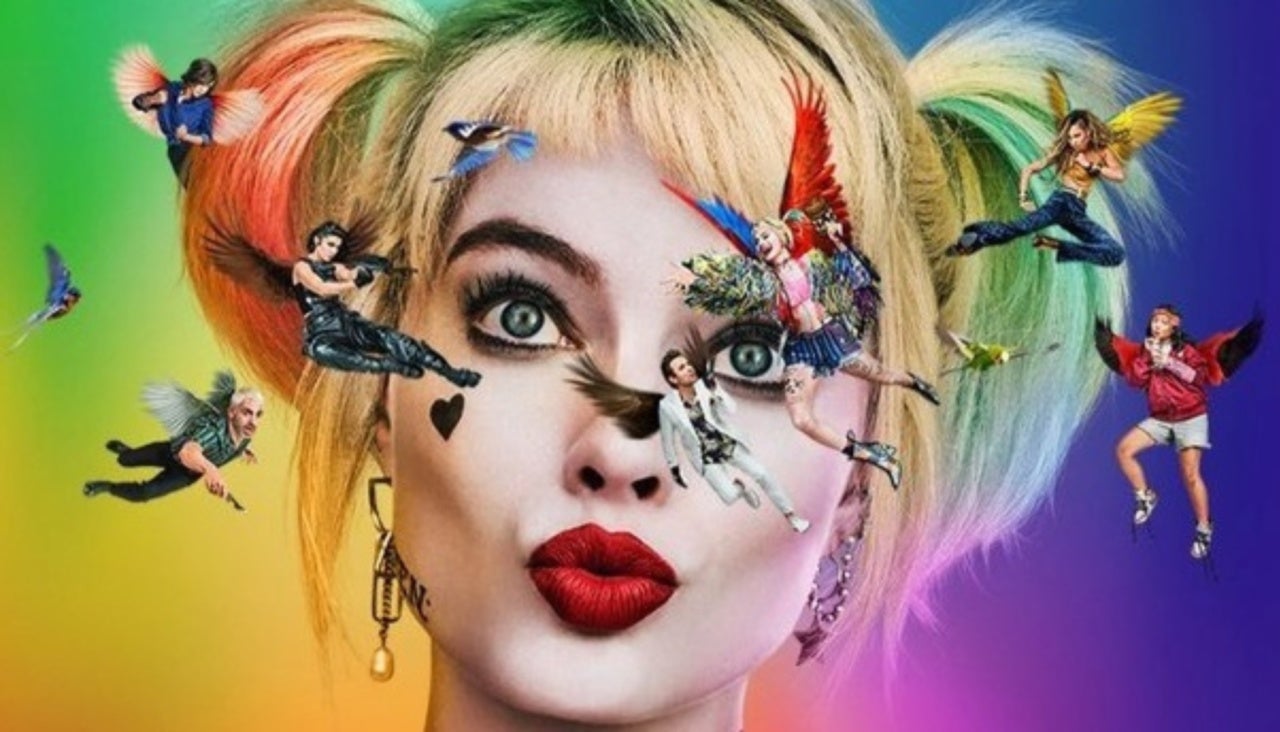After Joker took a break from the rebounding DC Extended Universe movie franchise last year, to create an Oscar-winning tapestry of gripping, starkly human drama, Birds of Prey (and the obnoxiously long joke subtitle that I refuse to type out throughout this entire review!), rockets us back into Warner Bros.’ usual shared DC movie universe, with all of the tender, loving care of a cocaine overdose. This means that Gotham City is officially done talking about corrupt capitalism, class warfare and neglect of the mentally ill on the big screen, and is proudly back to diving headfirst into the colourful, exaggerated reality of comic book convention, where criminal insanity is celebrated, and corrupt capitalism is pretty low on the population’s list of often-apocalyptic concerns. In case all of that pesky intellectualism in Joker left you worried that comic book movies are going to start forcing you to think.
All kidding aside though, what can one expect from a movie starring, narrated by and quite literally pitched by Harley Quinn? Indeed, this entire movie sprang from an idea devised by Harley Quinn’s DC Extended Universe actress, Margot Robbie, during filming of the character’s DCEU debut for 2016’s highly divisive Suicide Squad. Robbie initially suggested a movie starring Harley and several female DC super-villains, before converting the pitch into a vehicle for all-female superhero team, the Birds of Prey instead. The Birds of Prey have existed in DC Comics lore in some form since the mid-1990’s, even having a loosely-adapted, short-lived live-action series on The WB (now The CW), between 2002 and 2003, but they’re largely unknown to the mainstream populace, outside of dedicated comic book nerds and superhero enthusiasts. This is of course in stark contrast to Harley Quinn, who is literally DC’s most popular and recognized female character at this point, even surpassing Wonder Woman in that milestone as of the mid-2010’s, despite the fact that Harley wasn’t even a DC Comics character originally, and made her debut on beloved 1990’s TV cartoon, Batman: The Animated Series instead.
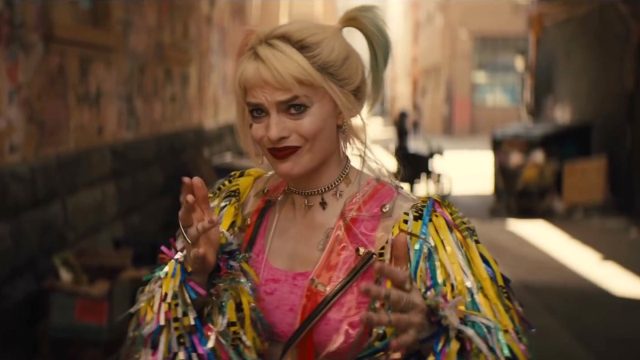
Clearly, Harley’s character has come a very long way from her humble cartoon origins, to the point where pairing her with the lesser-known Birds of Prey does seem like a recipe for success on paper. Considering that the superhero movie market has found a growing hunger for female-led productions as well, it seemed like the ideal time to release Birds of Prey into theatres, kicking off a year that’s going to be quite heavy in superhero movies that are directed by and star women. Despite its noble intentions however, Birds of Prey has ended up struggling at the box office, ultimately becoming the DCEU’s lowest-grossing movie to date, despite positive early reception from critics and fans. Granted, Birds of Prey’s R-rating isn’t doing it any favours either (bold as it is), and nor is its proximity to Joker, a DC movie that garnered so much attention that it ultimately became the highest-grossing R-rated movie of all time, as well as the first R-rated movie to gross over $1 billion worldwide, and Joker didn’t even need to take place in the DCEU to reach those milestones!
Birds of Prey’s box office struggles are a real shame though, since, despite the movie being pretty ridiculous and disposable, it is very entertaining, and is definitely a huge improvement over, say, last year’s more ill-fated Charlie’s Angels reboot, which hit you over the head with its feminist themes so hard that it could practically qualify as intellectual manslaughter. Birds of Prey, by contrast, does a much better job of selling its lead female ensemble, balancing a proudly ridiculous, self-aware narrative with a sense of high-powered, comic book-style thrills, and in turn showcasing the lighter side of Gotham City for the first time since the 90’s. Unsurprisingly, Robbie’s Harley Quinn is a real scene-stealer as well, effortlessly elevating the whole movie with her infectiously charming combination of can-do attitude and myopic self-destruction.
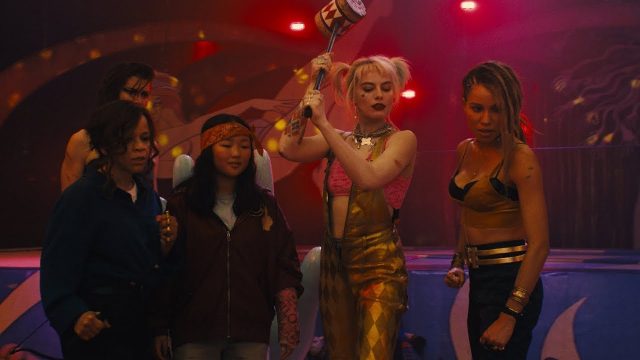
With its raucous R-rated edge and candy-coated, manic storytelling, Birds of Prey easily has the makings of a cult hit for the otherwise mainstream DCEU. Its DCEU predecessor, Shazam! may have ultimately been a more accessible, well-rounded attempt to create a bona fide superhero comedy for DC’s shared movie universe, but Birds of Prey still stands head-and-shoulders above uneven and clumsy early DCEU efforts like Suicide Squad. It delivers a simply-blended, but undeniably intense shot to the adrenaline centers of your brain, while packing in just enough ‘girl power’ punch to create a genuinely compelling new team of cinematic female anti-heroes, without alienating viewers with Y-chromosomes in the process.
Despite its rather eccentric full title (which has been altered to the more easily-searchable ‘Harley Quinn: Birds of Prey’ on ticket sites and apps), Birds of Prey doesn’t actually revolve around that budding band of anti-heroines, and is instead a movie entirely focused around Harley Quinn. Everything in Birds of Prey unfolds from Harley’s perspective, including the narrative timeline, which Harley will occasionally interrupt and shift around, according to her own whims. This creates the odd sensation that the actual Birds of Prey are supporting characters in their own movie, which might not sit right with every fan of their DC Comics inspirations, but it’s nonetheless true that Robbie’s returning Harley Quinn remains the key draw anyway, delivering the best and most engaging performance in a movie that’s already pretty loaded with fun and engaging performances.
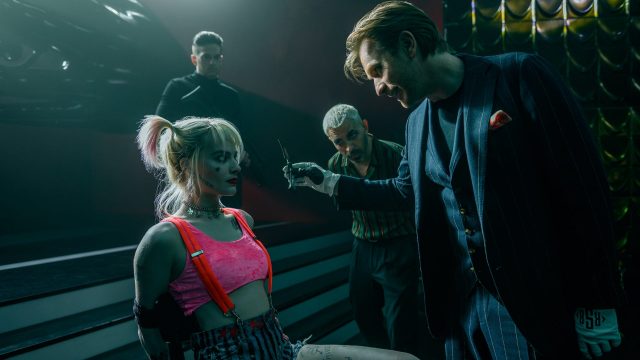
After being introduced as a supporting character in Suicide Squad, Robbie’s Harley finds herself easily capable of headlining her own movie in this case, now having split from the Joker after he breaks Harley out of Belle Reve Penitentiary (as seen in the ending portion of Suicide Squad), and being eager for so-called ’emancipation’. As you can imagine after years of co-dependency at the hands of the Joker however, Harley’s not exactly skilled at standing on her own, particularly when she impulsively kicks off every conflict and event in this movie, after she publicly signals to all of Gotham City that she’s now single. This has everyone that Harley’s ever wronged, or even mildly annoyed alongside the Joker, becoming desperate to put her head on a spike, now that the Joker is no longer protecting her. At the top of this list is the main villain of Birds of Prey, Roman Sionis, a.k.a. Black Mask, played by Ewan McGregor, who is currently one of the most dangerous and well-armed crime lords in Gotham City.
Normally, Black Mask is defined in other DC media as having a particularly intense hatred for Batman, though the DCEU’s rendition of the character doesn’t appear to have any indicated connection to the Dark Knight. Instead, McGregor’s Sionis is a cut-off rich boy and raging misogynist who has a particular dislike for Harley, only keeping his distance from her initially because he believed that the Joker would brutally retaliate if any action were taken against Harley. McGregor goes all in on even the worst, most disgusting traits of Sionis as well, playing gleefully against type as an over-the-top mobster who’s likely just as insane as Harley, despite his outward charm with his club patrons. The clash between the self-serving, but innocently playful performance of Robbie, and the uncomfortable, yet kooky performance of McGregor, creates a great double act, one that never requires the presence of Batman nor the Joker to make this character dynamic work.
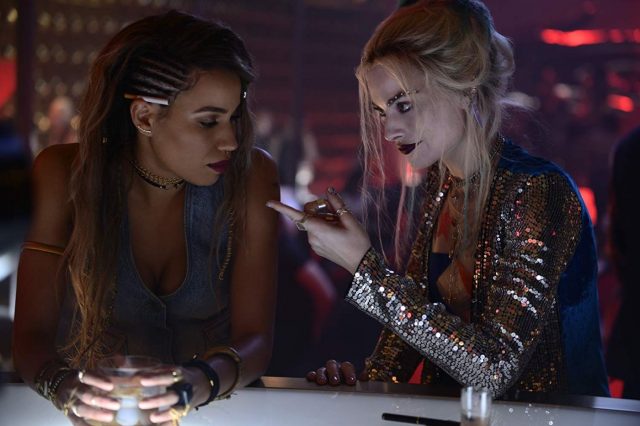
Fortunately, the supporting cast in Birds of Prey is just as entertaining as well, even if the actual Birds of Prey characters feel a little glossed over in the storytelling. Among the most frustratingly short-changed personalities in this movie is Mary Elizabeth Winstead’s Helena Bertinelli/Huntress, a highlight Birds of Prey personality whose cold, badass demeanour betrays a weirdly endearing social awkwardness. Jumee Smollett-Bell and Rosie Perez also excel as downtrodden Sionis employee, Dinah Lance/Black Canary and under-appreciated GCPD detective, Renee Montoya, respectively. Smollett-Bell’s Black Canary presents a more cynical and hardened take on the fan-favourite DC heroine, but one that still has a punk-ish charm that makes her a likable presence. Likewise, Perez’s Montoya is an aged and alcoholic cop who’s oblivious to her own cliched dialogue and lifestyle, despite being one of the few genuinely good cops left in Gotham. These three Birds of Prey members sometimes feel like they’re actually in an extended trailer for a sequel that’s far from guaranteed here, but at least they present lots of promise for further roles in the DCEU, whether linked to Harley Quinn or not.
The supporting anti-heroine that definitely has the most bearing on the plot in Birds of Prey however is Ella Jay Basco’s Cassandra Cain, the character that deviates most heavily from her portrayal in DC Comics lore to boot. In the DC Comics Universe, Cassandra debuted as a mute, illiterate and socially stunted daughter of two assassins, who eventually takes up the mantle of Batgirl, after Barbara Gordon has to abandon it on account of being paralyzed by the Joker. These events have since been erased from DC’s comic book continuity after the New 52 and Rebirth reboots though, which have restored Barbara Gordon as the DC Comics Universe’s one and only Batgirl, and have instead given Cassandra Cain a new identity as assassin prodigy, ‘Orphan’. In the DCEU however, Cassandra Cain is simply a teenager and expert thief with neglectful parents, who inadvertently steals a diamond from Sionis, Birds of Prey’s key macguffin, netting Cassandra a target on her back, alongside Harley. This sets up an interesting mentor/mentee relationship between Harley and Cassandra, something else that could keep developing in future DCEU movies, while presenting some solid humour in the case of this movie.
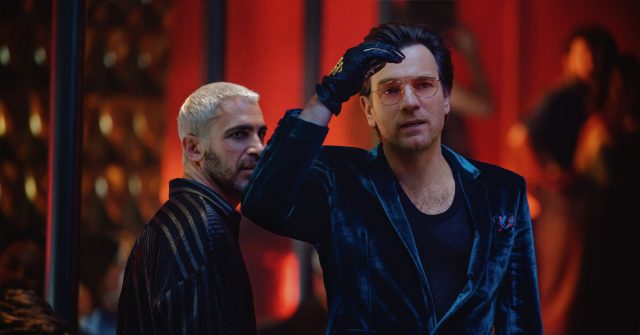
Again though, Birds of Prey’s proximity to Joker can sometimes work against it, even with the two movies taking place in entirely separate universes. Harley’s journey to so-called ’emancipation’ is made intentionally silly and over-the-top, as are the heroic journeys of the supporting cast, which is certainly fun, but the lack of depth is a lot more noticeable than it otherwise would be if Joker hadn’t debuted in theatres less than six months ago. Even McGregor’s Sionis is a ultimately a caricature of an antagonist, coming off like a spurned rich boy who’s overcompensating for seemingly everything imaginable, despite his own apparent success in the mob world. Weirdly, Birds of Prey’s most believable villain portrayal actually comes from Chris Messina as Sionis’ main lieutenant, Victor Zsasz, another recognizable, lesser-known foe of Batman in DC Comics lore, whose toady grin and sinister, wispy delivery add the requisite menace that McGregor’s Sionis would otherwise expend through his own unrepentant foolishness. Even if these personalities are pretty intentionally airheaded though, viewers will likely still have fun with the characters in Birds of Prey, who can optimistically be seen as a more inviting and undemanding dessert selection to ease moviegoers back into the DCEU, after Joker no doubt hit audiences close to home with its commentary on our real-world societal underbelly.
Harley’s complicated psychology provides almost all of the perceived storytelling ‘depth’ in Birds of Prey, which presents another small-scale side chapter in DCEU canon, one that seems uninterested in providing any sort of larger consequences for DC’s shared movie universe. Birds of Prey may actually present the simplest and most straightforward plot progression in DCEU continuity so far in fact, despite the robust cast of lead characters at play. Since everything is presented through Harley’s unreliable narration and eccentric perspective however, Birds of Prey nonetheless has no desire to take itself that seriously, which is both a strength and a weakness in equal measure.
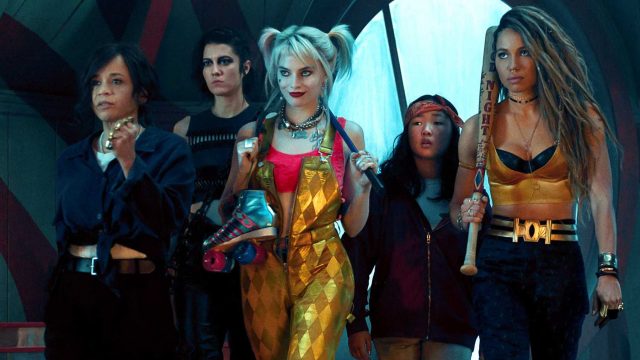
Considering that Harley is an unreliable narrator, the storytelling focus in Birds of Prey can feel inconsistent and unpredictable, sometimes to a fault. At times, this really works, especially since it prevents the movie from ever settling into a predictable or dull groove. During the instances where this storytelling direction doesn’t work however, an otherwise simple plotline of chasing a lost diamond for a crime lord can become needlessly complicated, as if it’s trying to take a sort of Guy Ritchie meets Gotham City approach, but unsuccessfully. I doubt that fans of Batman, Harley Quinn and/or DC in general will be too fussed though, since they probably already know these characters to some extent, and will probably be more tolerant of Harley-fueled narration that doesn’t bother to accommodate their expectations for how the story plays out.
Despite said unreliable narration as well, Birds of Prey is still surprisingly accessible for people who don’t know the first thing about its characters, or the DC Universe in general outside of the movie space. You don’t even need to have seen any other DCEU movies to follow the events of Birds of Prey either, even if it is at least a little bit helpful to watch Suicide Squad beforehand, so you can understand some of the subtle jokes and offbeat backstory presented by Harley in this movie. Even if you haven’t seen Suicide Squad however, Birds of Prey doesn’t struggle to entertain as a criminal-themed farce on its own merits, so long as you’re not aiming to take it that seriously. If the surprisingly great Shazam! was any indication as well, the DCEU is ripe for smaller, more comedy-oriented storylines that don’t need to be epic in scope. Birds of Prey rises to that task well, on top of nicely standing apart from the more family-friendly Shazam! with its foul-mouthed, comically violent R-rating all the while.
(NOTE: The ‘Spoiler’ section, when clicked, discusses larger connections and teases for the DC Extended Universe in Birds of Prey, as well as addressing post-credits scenes, and how Batman and Joker may or may not play into the movie.)
Ultimately though, the Suicide Squad references are the only way that Birds of Prey provides any development to the ongoing DCEU canon. The movie has no post-credits scenes, and any viewers waiting until after the credits finish are instead merely treated to a joke line from Harley, who is cut off before supposedly spilling a controversial secret about Batman. There are also no cameos from any other previously established DCEU characters outside of Margot Robbie’s Harley Quinn (Boomerang poster notwithstanding), nor are any other DCEU characters mentioned outside of Batman, Joker and the implied existence of the Suicide Squad, even if that name, nor the name, “Task Force X”, is never actually uttered. Finally, while Harley and Cassandra ultimately diverge from the newly-formed Birds of Prey at the conclusion of the movie, there are no concrete teases regarding future DCEU movies here, so those hoping for a taste of what’s to come in next year’s The Batman or The Suicide Squad movies will certainly be disappointed, as there’s no setup for either.
Birds of Prey is the second DCEU movie to be directed by a woman, following Patty Jenkins directing 2017’s Wonder Woman, and like Jenkins, Cathy Yan had only previously directed one feature film before taking on a DCEU blockbuster, that being 2018’s Chinese dark comedy indie flick, Dead Pigs. Yan is also the first Asian-American female director to helm a superhero movie, narrowly beating Eternals’ Chloe Zhao for that achievement, and the fact that she got her feature directing start on a dark comedy is definitely very helpful here. Birds of Prey benefits from a biting, but weirdly affectionate spirit in its direction, somehow managing to present hard-hitting violence alongside a strange sense of perverse criminal innocence. The movie’s presentation is intentionally messy and unpredictable, due to Harley’s unreliable narration, but the fact that Yan managed to pull together the nonsense sensibilities of a deranged lunatic, and craft them into something legitimately engaging and fun for the audience, is a huge testament to how strong her direction is here.
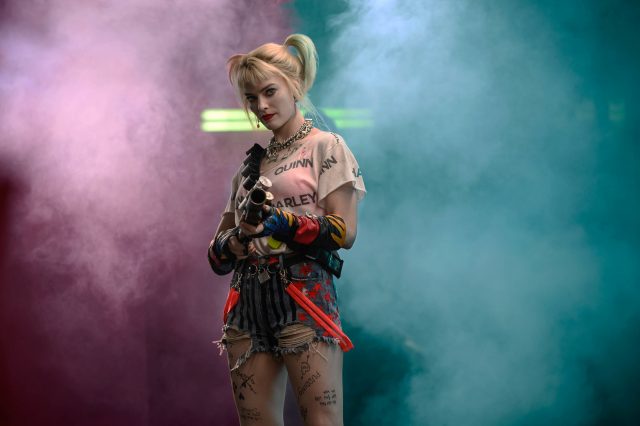
Birds of Prey is an incredibly challenging movie to helm, considering how often it meanders on intentional tangents, and how sharply it can shift between a grounded sense of low-class humanity, and an over-the-top sense of sardonic self-ridicule. Somehow, Yan avoids making the movie feel like a complete mess too, never missing a beat when it comes to the action, the comedy, or the passing moments of tongue-in-cheek drama. Granted, Birds of Prey is pretty light on drama overall, and like Shazam! before it, it’s very blatantly designed as a comedy first and foremost, one that occasionally interjects scenes of violent, but slickly-realized action sequences to keep the breathless pacing going.
As much as Birds of Prey’s script, which was put together by Bumblebee writer, Christina Hodson (who has apparently also been hired by Warner Bros. and DC to pen the DCEU’s upcoming Flash movie for 2022), is full of great jokes and engaging action sequences, it is a little bit on the lightweight side, and could have easily led to a rather boilerplate leading woman debut for Margot Robbie’s Harley Quinn. It’s amazing then that Yan is able to squeeze so much out of such a simple story through her direction, packing Birds of Prey with zany, colourful and sometimes downright absurd directing flourishes, which not only blend seamlessly with the damaged psychology of Harley Quinn, but also manage to inject a ton of unique character into a movie that otherwise isn’t aiming to make big waves in the DCEU canon. Yan’s direction especially stands out in the action scenes as well, which have a powerful, but almost cartoon-ish joy to them, never managing to grate or exhaust the viewer, even as Harley almost intentionally seeks out trouble at times, either because she’s not good at making long-term tactical decisions, or she’s just too dumb to quit.
Like Suicide Squad, Birds of Prey packs in an eclectic mix of licensed singles to go with its original score, only this time, as you may be able to predict, all of the movie’s pop song offerings are performed by women. Most of Birds of Prey’s ‘girl power’ flavouring definitely appears to be conveyed in the movie’s soundtrack, which has more of an indie pop vibe than the mainstream-friendly pop classic sensibilities of Suicide Squad. Still, this fits with the tone of the upstart anti-heroines in Birds of Prey, and while this soundtrack is full of lesser-known talent, it’s still pretty fun in the moment. DC’s licensed track sensibilities are still trailing the likes of Marvel Studios’ Guardians of the Galaxy movies to be sure, but even if Birds of Prey’s soundtrack selection still can’t achieve that same level of memorability, it’s nonetheless well-chosen, if a little less instantly recognizable.
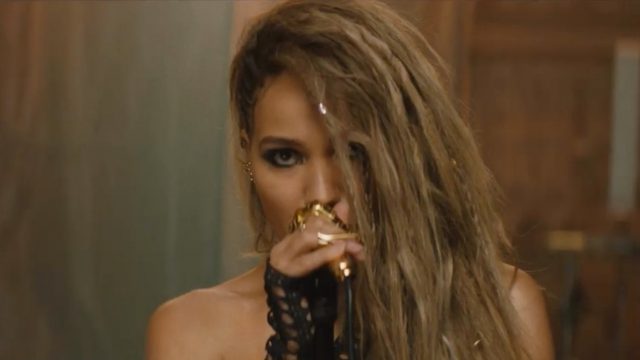
The rest of the musical stylings are just as unpredictable and off-the-wall as Harley herself, with Daniel Pemberton’s original score compositions cutting in between the licensed singles to occasionally inject some light-hearted, but undeniably energetic instrumental selections. By contrast however, the sound mixing in Birds of Prey proudly hits you like a mallet to the face, particularly in IMAX theatres, where every bone-crunching blow in the action scenes will have you wincing. Despite Birds of Prey being a lot smaller in scale than many previous DCEU movies, its sound engineering is working overtime to keep the audience engagement high, even during some of the quieter moments, which can nonetheless be punctuated nicely with anything from deranged hyena giggles to yet another knife going into Harley’s Joker drawing. Birds of Prey may not reach the spectacular soundtrack highs of Batman v Superman: Dawn of Justice by any means, but its audio is nonetheless quite well-produced, even when it’s primarily dealing with smaller-scale characters that mostly lack superpowers.
There’s not a whole lot to say about the special effects suite of Birds of Prey, which is incredibly limited in scope, even compared to the similarly modestly-budgeted Shazam! that preceded it. Birds of Prey only has one character with any kind of superpowers most notably (that being Jumee Smollett-Bell’s Black Canary), and mostly uses its visual flourishes to demonstrate the unpredictable psychology of Harley in certain scenes, or utilize crude, cartoon-style animation to detail certain elements of Harley’s backstory. This means that the IMAX cut of Birds of Prey doesn’t ultimately add much to the experience, beyond a bit of extra punch to the audio, but the smaller-scale visual flourishes in Birds of Prey nonetheless still do a good job of adding to a movie that otherwise isn’t terribly flashy. Even the crayon-style audience prompts injected throughout various scenes feel fun and strangely fitting, further contributing a simple, but charming sense of character to a movie that’s otherwise so frequently violent and demented.
Birds of Prey may not be as consistent or as sharp a DCEU comedy as Shazam! before it, but as an offbeat and experimental new side chapter in DCEU lore, it’s entertaining and memorable. The movie’s lead female ensemble and hard-hitting, yet kooky R-rated edge also help it stand very nicely apart from prior DC movies, both in and out of the DCEU. Those feeling a little burned-out and exasperated from Hollywood’s continued botching of female-driven blockbuster vehicles may also be relieved to know that Birds of Prey is a cut above that usual crop, being funnier, more exciting, and less concerned with over-selling cinematic feminism. Indeed, one of the wisest decisions that this movie makes with its female ensemble is that it’s not afraid to make them look silly or undignified, nor is it afraid to declare that they have to earn their place as heroes, or perhaps villains, in a shared universe wherein Wonder Woman had previously cornered the market on beloved female paragons. Rather than impotently trying to tell us how cool its anti-heroines are, Birds of Prey lets the titular women sell themselves through their actions and innate appeal, and it works. It works well!
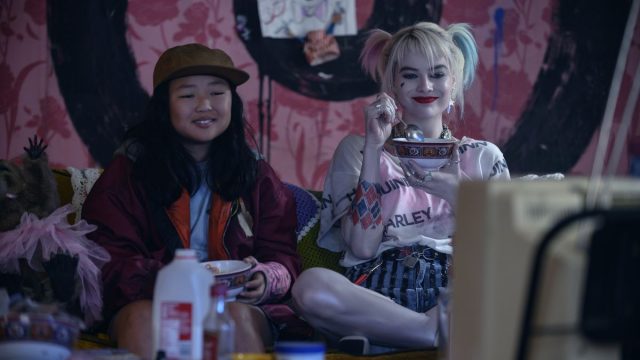
As much as I’m looking forward to seeing what’s next for all of these characters in future DCEU projects however, which I hope do eventually come to fruition, despite this movie’s initially slow start at the box office, Birds of Prey still isn’t perfect. Outside of Harley Quinn, its characters feel like they’re being set up to be properly fleshed out in a future movie that may or may not happen, and even then, there isn’t much depth to the storytelling overall. One may not necessarily expect a lot of depth here, but once again, Shazam! managed to have both depth and humour, whereas Birds of Prey pretty much goes all in on the latter, letting its R-rated pottymouth and violent action scenes pick up the slack in turn. A cynic might call this disposable, and they may not be entirely wrong.
That being said however, I still had a lot of fun with Birds of Prey, especially when it allowed me to appreciate its eccentric female leads on my own terms, rather than continually stalling its own momentum to lecture me on why I should. I do have to praise this movie for its sheer creativity and courage, especially in proudly sporting an R-rating, and having the conviction to follow the also-R-rated Joker, the highest-grossing R-rated movie of all time, and an Oscar winner. That inevitably wasn’t going to translate to outstanding box office fortunes, but personally, I don’t think a movie’s worth should be entirely measured on what it rakes in for a studio, because that would make the Twilight, Fifty Shades and Transformers movie franchises full of undisputed classics. Like Harley Quinn herself, Birds of Prey can be a bit of a mess at times, but somewhere beneath all of its glossy silliness, some true genius lies buried beneath that persistent desire to obliterate skulls and testicles.

